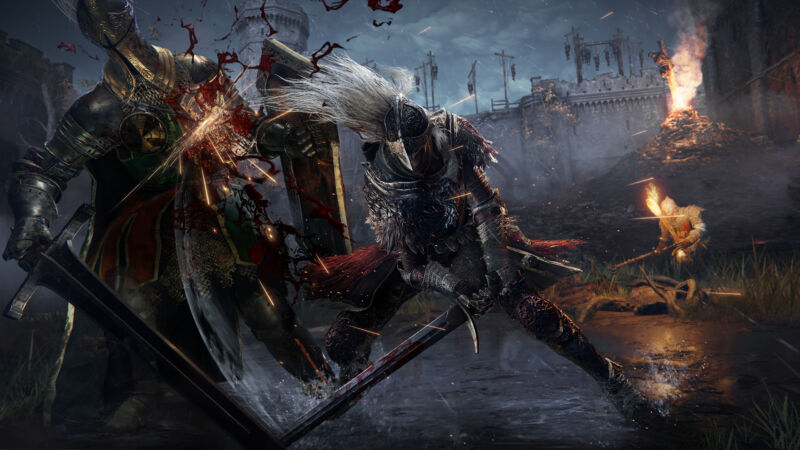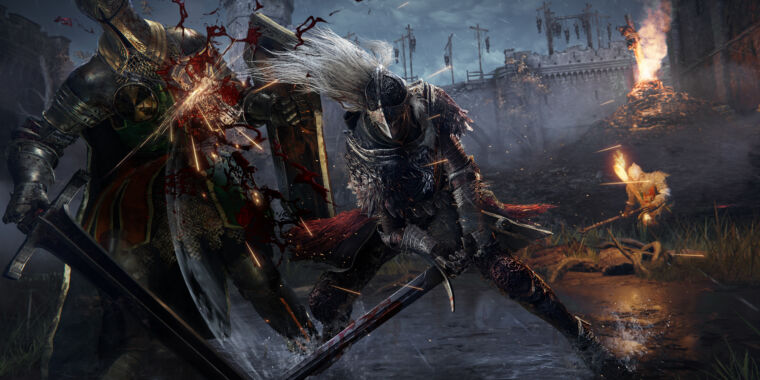Is Elden Ring really that hard? Well, it depends what you mean by “hard”
[ad_1]

Every time FromSoftware releases a new title, the entire gaming community seems to get wrapped up in the same tired debates about game difficulty. One side complains that games like Dark Souls and Bloodborne are just too hard for their own good and that only masochists enjoy games that punish players for every little mistake. On the other side, die-hard FromSoftware fans will argue vehemently that the games aren’t really that difficult if you just play them correctly.
The release and massive success of Elden Ring has predictably revived those debates, leading to familiar and circular arguments. To help end the bickering, we’ve tried to break down the vast and loaded concept of “difficulty” in video games into an Ars Difficulty Matrix (™) consisting of five noncomprehensive subcategories.
We’ve laid out the elements of that matrix below, and for each element, we’ve tried to explain how Elden Ring fits into the history of game design. In doing so, we hope to show that Elden Ring can be both brutally difficult and incredibly easy. It all depends on what, exactly, you mean by “difficulty.”
Mechanical difficulty
Mechanical difficulty simply refers to the way games require players to hit a certain set of buttons in a certain timing window to complete the next objective. This form of difficulty is also sometimes referred to as a “reflex test.”
Mechanical difficulty has a very long history in gaming. Classic arcade games overwhelmingly relied on increasingly difficult reflex tests to weed out players and force them to put in another quarter. Early console games often did something similar, using demanding mechanical challenges to increase the play time on cartridges with limited storage space. When people talk about games being “Nintendo Hard”, they’re usually talking about mechanical difficulty.
While pure mechanical difficulty isn’t as popular in games as it once was, it still features prominently in platformers like Super Meat Boy, Celeste, or the so-called “Kaizo Mario” ROM hacks, to name just a few.

Compared to games like that, Elden Ring just isn’t very mechanically difficult. Most enemies telegraph their attacks with massive, seconds-long animations that give players plenty of time to react with a well-timed dodge, block, or parry. Some of the game’s platforming sections require precision double-jumps on a horse, but most of them are optional. While you can’t just button-mash your way to victory in Elden Ring, you don’t need preternatural hand-eye coordination to make progress either.
But while each individual block and attack may not be mechanically difficult, Elden Ring can require a lot of focus and endurance to chain those moves together into a successful battle (or series of battles). That’s especially true when multiple enemies gang up to attack you from all sides. So moves in Elden Ring are kind of like pushups; performing one child’s play, but performing 100 in a single chain can be torture.
Which brings us to…
Punishing difficulty
This side of the Ars Difficulty Matrix measures how much penalty you pay for failure to complete an objective. How many mistakes do you get before facing the words “game over”? And when you do get a “game over,” how much progress do you lose?
In a title like Spelunky, a single mistake can mean restarting your entire run from the absolute beginning. On the other end, Quantic Dream games like Heavy Rain or Detroit: Become Human don’t have a “failure” state in the first place. They simply adapt the ongoing story to whatever you decide to do.
When people say Elden Ring and other FromSoftware games are difficult, the word those gamers are actually looking for is “unforgiving.” FromSoftware makes games where one false move against even minor enemies can cost you a significant chunk of your health bar or even lead to instant death.
While Elden Ring is a bit more generous than its predecessors with the flasks that can refill your health bar away from a checkpoint, using those flasks requires pausing for a lengthy animation that can open you up to a merciless counterattack if you’re not careful. And that doesn’t even get into the situations where you simply roll off a ledge and tumble hilariously to your death.
[ad_2]
Source link




